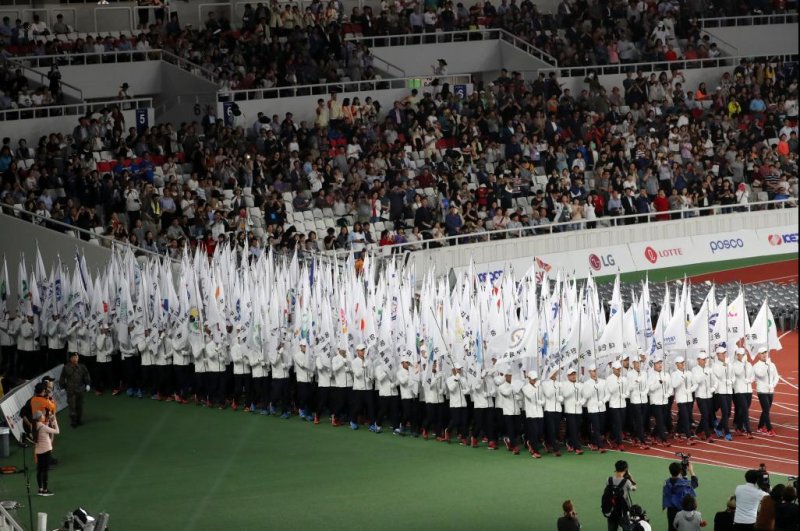1 of 2 | Flag-bearers enter the opening ceremony of the 100th Korean National Sports Festival at Jamsil Sports Complex in Seoul on Friday. Photo by Yonhap
SEOUL, Oct. 9 (UPI) -- After a high-profile South Korean athlete stepped forward with watershed sexual assault allegations against her coach, the Seoul Metropolitan Government has set up a sexual assault resource center at one of the country's largest sporting events.
More than 44,000 people attending Seoul's 100th National Sports Festival this week will have access to the temporary center at Jamsil Stadium, which is offering professional counseling and other support to those who experience sexual misconduct. Roughly 60 sporting events at the festival, which runs through Thursday, will have on-site volunteers to assist athletes or event attendees with reporting sex crimes and seeking medical treatment.
"Anyone involved or related to these sporting events will be able to receive help from the center," Kim Soon-hee, an official at the city's Women's Family Policy Office, told UPI. "We created a team and a system to prevent potential incidents of [sexual misconduct], especially after the #MeToo movement."
Earlier this year, South Korea erupted into a nationwide conversation about sexual misconduct in sports when short-track speed-skating champion Shim Suk-hee accused her coach, Cho Jae-beom, of assaulting her multiple times since 2014. Cho is under investigation for the allegations and was separately sentenced to a 10-month stint in prison for physical assault.
The National Human Rights Commission of Korea announced a yearlong crackdown on sexual assault in sports in April, with a preliminary investigation revealing more than 30 cases of reported abuse.
Kim Dong-shik, an expert at the Korean Women's Development Institute, said the center is a good first step to stopping abuse in sports. Last year, a survey of South Korean athletes during the height of the country's #MeToo movement found that 20 percent of players experienced some form of sexual violence.
"We need this service in every area, especially sports, because sports have a stronger sense of hierarchy and rank in its authoritative power structure," Kim Dong-shik said. "If something happens to the team, the image of the team is ruined and so people try to cover the incidents ... They try to quiet the victim, which is why the problem is often never solved."
Jeong Seung-hee, a 25-year-old college student, empathized with athletes like Shim Suk-hee who came forward with sexual assault allegations.
"I felt so bad for her. By telling the truth, she decided to give up her career," Jeong told UPI. "It's so difficult to report sexual assault as a woman living in a conservative society, where the blame falls on the victims and women to 'do better' in these situations ... Even if women report it to the police, it's hard to prove that they've been sexually assaulted."
More than 32,800 crimes involving sexual violence were recorded by the government in 2017, according to the Korean Statistical Information Service. In a nation of more than 50 million people, it's possible that even more cases of assault are going unreported -- and the challenges behind reporting sex crimes leaves some women doubting whether resource centers at sporting stadiums will actually be used.
"I don't think many people will actually go to this center and report sexual crimes ... If they actually do report it, their careers would be in jeopardy," Jeong said. "I like the purpose of the center, but I'm just not sure about the practicality of it."
South Korea's #MeToo movement has reached further than the sports industry, with prominent lawyers, politicians and actors sharing their experiences with sexual violence on the national stage. In May 2018, thousands marched to protest the nation's phenomenon of spycam pornography, which includes the filming of women in places like public bathrooms and hotels without their knowledge.
"Sexual misconduct has been an issue in Korea for a long time, but it just came to the surface recently," Kim said. "It was finally a wake-up call for men in our society."
Peter W. Choi contributed to this report.















